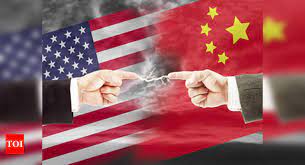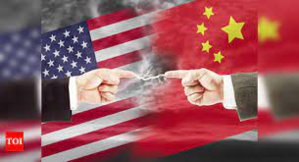The White House stated that Joe Biden, the US President, spoke with Xi Jinping, his Chinese counterpart, for the first time in seven weeks. They urged them to ensure that there is no "competition," and not "conflict", the White House stated.
Biden stated that the United States wanted to make sure that "the dynamic remains competitive and that we don’t have any future situation where we veer in unintended conflict," a top US administration official said to reporters.
CCTV, the Beijing state broadcaster, reported that the call was "candid, deep" and covered "extensive strat communication and exchanges on China and US relations and issues mutual concern." It also stated that US policies on China have caused "serious problems."
This was the first call between the leaders since February, when they spoke for two hours shortly after Donald Trump took over as President. According to a Biden administration official, the most recent call lasted for 90 minutes.
Trump launched a trade war with China, resulting in a sharp drop in US-China relations. While Biden's administration urged multilateralism, an end to Trump’s "America first” ideology, it has maintained trade tariffs and is still tough on other areas of the relationship.
The White House however indicated that the diplomatic impasse was unsustainable and potentially dangerous, and called for intervention from the leaders during Thursday's call.
The official spoke under anonymity and said that while we welcome stiff competition, we don't want it to lead into conflict.
The call had the goal of setting "guardrails" to ensure that the relationship could be managed responsibly.
The official stated that these safeguards include making sure that US actions don't get "misinterpreted by China."
Lower-level attempts to engage China have failed, particularly in the angry March exchange between Antony Blinken, Secretary of State, and top Chinese officials at Anchorage, Alaska.
Reporters were told by a senior official that they weren't satisfied with the behavior of their interlocutors.
The official accused the Chinese of being "unwilling" to engage in substantive or serious talks. He stated that "we don’t believe that this is how responsible nations act, especially considering the global importance of US-China rivalry."
The official stated that President Biden realized the importance of directly engaging President Xi in the impasse.
A White House readout after the call indicated that Biden and Xi had "discussed areas in which our interests converge, as well as areas where we differ in our values and perspectives."
The official stated that Thursday's call was focused on "broad, strategic" issues. No concrete decisions were expected to be made on any outstanding issues or the setting up of a first Biden Xi summit.
There are many disagreements between Washington, China and Beijing.
The White House official complained about China's "unfair and coercive trading practices". There is increasing tension over China’s claims to Taiwanese islands and the South China Sea.
Washington is also upset by China's refusal of cooperation in an international probe into the origins and spread of the Covid-19 virus. This virus first appeared in China, before spreading to other parts of the world.
The two countries may also have to cooperate in certain areas, such as the North Korean nuclear weapons program or the climate crisis.
According to the White House, Biden and Xi had discussed climate change and the Covid pandemic. Biden raised concerns about Chinese cyberattacks on the United States.
The senior official stated that Thursday's call was not about reaching breakthrough agreements.
It was about "keeping the channels open for communication" and ending old cycles that had caused friction in the relationship.
The official stated that "our goal is, to really reach an even state of affairs between China and the United States."
Biden, who had a strong relationship with Xi during his time as vice president under Barack Obama's presidency, clearly believes in his ability to make personal contact when it is about diplomacy.
According to a senior US official, the leaders had a lot of conversations about shared experiences. The tone was respectful and candid without being lecturing.
(Source:www.ndtv.com)
Biden stated that the United States wanted to make sure that "the dynamic remains competitive and that we don’t have any future situation where we veer in unintended conflict," a top US administration official said to reporters.
CCTV, the Beijing state broadcaster, reported that the call was "candid, deep" and covered "extensive strat communication and exchanges on China and US relations and issues mutual concern." It also stated that US policies on China have caused "serious problems."
This was the first call between the leaders since February, when they spoke for two hours shortly after Donald Trump took over as President. According to a Biden administration official, the most recent call lasted for 90 minutes.
Trump launched a trade war with China, resulting in a sharp drop in US-China relations. While Biden's administration urged multilateralism, an end to Trump’s "America first” ideology, it has maintained trade tariffs and is still tough on other areas of the relationship.
The White House however indicated that the diplomatic impasse was unsustainable and potentially dangerous, and called for intervention from the leaders during Thursday's call.
The official spoke under anonymity and said that while we welcome stiff competition, we don't want it to lead into conflict.
The call had the goal of setting "guardrails" to ensure that the relationship could be managed responsibly.
The official stated that these safeguards include making sure that US actions don't get "misinterpreted by China."
Lower-level attempts to engage China have failed, particularly in the angry March exchange between Antony Blinken, Secretary of State, and top Chinese officials at Anchorage, Alaska.
Reporters were told by a senior official that they weren't satisfied with the behavior of their interlocutors.
The official accused the Chinese of being "unwilling" to engage in substantive or serious talks. He stated that "we don’t believe that this is how responsible nations act, especially considering the global importance of US-China rivalry."
The official stated that President Biden realized the importance of directly engaging President Xi in the impasse.
A White House readout after the call indicated that Biden and Xi had "discussed areas in which our interests converge, as well as areas where we differ in our values and perspectives."
The official stated that Thursday's call was focused on "broad, strategic" issues. No concrete decisions were expected to be made on any outstanding issues or the setting up of a first Biden Xi summit.
There are many disagreements between Washington, China and Beijing.
The White House official complained about China's "unfair and coercive trading practices". There is increasing tension over China’s claims to Taiwanese islands and the South China Sea.
Washington is also upset by China's refusal of cooperation in an international probe into the origins and spread of the Covid-19 virus. This virus first appeared in China, before spreading to other parts of the world.
The two countries may also have to cooperate in certain areas, such as the North Korean nuclear weapons program or the climate crisis.
According to the White House, Biden and Xi had discussed climate change and the Covid pandemic. Biden raised concerns about Chinese cyberattacks on the United States.
The senior official stated that Thursday's call was not about reaching breakthrough agreements.
It was about "keeping the channels open for communication" and ending old cycles that had caused friction in the relationship.
The official stated that "our goal is, to really reach an even state of affairs between China and the United States."
Biden, who had a strong relationship with Xi during his time as vice president under Barack Obama's presidency, clearly believes in his ability to make personal contact when it is about diplomacy.
According to a senior US official, the leaders had a lot of conversations about shared experiences. The tone was respectful and candid without being lecturing.
(Source:www.ndtv.com)






